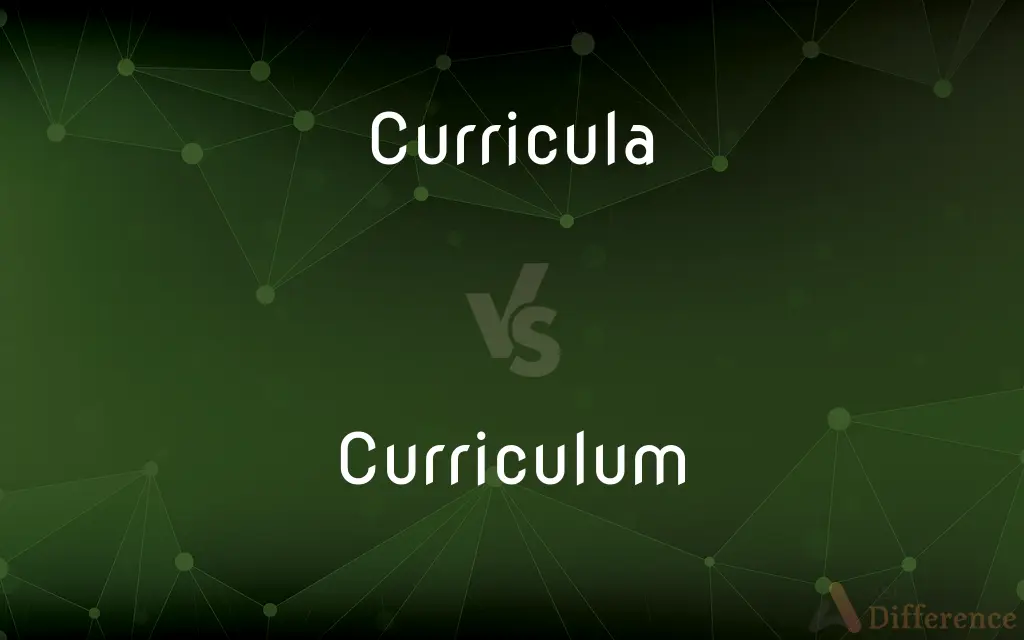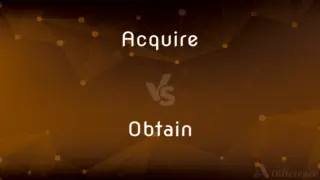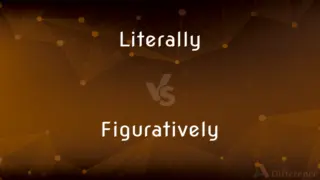Curricula vs. Curriculum — What's the Difference?
By Urooj Arif & Fiza Rafique — Updated on March 8, 2024
Curriculum refers to a course of study in a school or college, whereas curricula are the plural form, indicating multiple courses of study or educational programs.

Difference Between Curricula and Curriculum
Table of Contents
ADVERTISEMENT
Key Differences
A curriculum is a structured set of educational materials and guidelines outlining the subjects or courses to be taught in a particular education program or at a specific institution. It details the lessons, assignments, objectives, and performance expectations for a single course of study. On the other hand, curricula represent the collective courses of study offered by an educational institution or multiple programs across different grades or departments.
The term curriculum is often used when discussing the educational content provided within a single program or course, focusing on the specific learning outcomes, educational goals, and instructional strategies involved. Curricula, as the plural form, encompass a broader scope, referring to an array of educational programs and courses available within an institution or across various educational levels, highlighting the diversity and range of educational offerings.
While a curriculum may detail the progression through a single subject or course, outlining specific topics, required readings, and evaluation methods, curricula provide a comprehensive overview of all educational content offered, allowing for comparison and coordination among different programs or courses within an educational system.
In practical application, educators and administrators use the term curriculum to plan, evaluate, and improve the educational experience within a particular course or subject area. Conversely, when referring to the wide array of courses and subjects available for study, discussing program development, or comparing educational systems, the term curricula is used to capture the multiplicity of educational offerings.
Understanding the distinction between curriculum and curricula is essential for educational planning, program development, and academic discussions, ensuring clarity when referring to the scope and details of educational content and programs.
ADVERTISEMENT
Comparison Chart
Definition
A structured set of educational guidelines for a single course of study
The plural form of curriculum, indicating multiple courses of study or programs
Scope
Singular, focusing on one course or program
Plural, encompassing multiple courses or programs
Usage
Discussing educational content and strategies within a specific program
Referring to the range of educational offerings across an institution or system
Focus
Details lessons, objectives, and expectations for one course
Provides an overview of all educational content available
Application
Used for planning and evaluating a single educational experience
Used when comparing or coordinating among different educational programs
Compare with Definitions
Curricula
Educational guidelines.
The new science curriculum includes updated modules on climate change.
Curriculum
Range of programs.
The university offers diverse curricula across its colleges.
Curricula
Course progression.
The curriculum outlines a clear progression from basic to advanced topics in mathematics.
Curriculum
Educational diversity.
The school's curricula include arts, sciences, and vocational training.
Curricula
Evaluation methods.
The curriculum specifies various evaluation methods, including exams and projects.
Curriculum
Program development.
New curricula are being developed to address emerging technological fields.
Curricula
Learning objectives.
Each unit in the curriculum has specific learning objectives tied to assessments.
Curriculum
System-wide coordination.
The district aims to improve system-wide coordination among its curricula.
Curricula
Instructional materials.
The curriculum provides a list of recommended texts and resources for teachers.
Curriculum
Comparative analysis.
Comparing curricula can help identify strengths and gaps in an educational system.
Curricula
All the courses of study offered by an educational institution.
Curriculum
In education, a curriculum (; plural curricula or curriculums) is broadly defined as the totality of student experiences that occur in the educational process. The term often refers specifically to a planned sequence of instruction, or to a view of the student's experiences in terms of the educator's or school's instructional goals.
Curricula
A group of related courses, often in a special field of study
The engineering curriculum.
Curriculum
All the courses of study offered by an educational institution.
Curricula
Plural of curriculum
Curriculum
A group of related courses, often in a special field of study
The engineering curriculum.
Curriculum
The set of courses, coursework, and their content, offered at a school or university.
Curriculum
(obsolete) A racecourse; a place for running.
Curriculum
A race course; a place for running.
Curriculum
A course; particularly, a specified fixed course of study, as in a university.
Curriculum
An integrated course of academic studies;
He was admitted to a new program at the university
Common Curiosities
What is a curriculum?
A curriculum is a comprehensive set of educational guidelines and materials for a specific course or program, detailing what will be taught and how.
Can a single teacher be responsible for multiple curricula?
Yes, a teacher can be responsible for multiple curricula if they teach different subjects or courses.
Why is understanding the difference between curriculum and curricula important?
It's crucial for clarity in communication about educational content, whether discussing a single course of study or comparing multiple programs.
How does curricula differ from curriculum?
Curricula is the plural form of curriculum, referring to multiple courses of study or educational programs, rather than just one.
How do curricula reflect the goals of an educational institution?
Curricula embody the educational goals, values, and priorities of an institution, showcasing the breadth and depth of learning opportunities offered.
Is the curriculum the same as the syllabus?
No, the curriculum is broader, outlining the overall goals and content of a course or program, while a syllabus is a detailed plan for a specific course, including topics, readings, and assignments.
Can a curriculum include extracurricular activities?
While primarily focused on academic content, a curriculum can reference extracurricular activities that support educational objectives.
Are digital resources included in modern curricula?
Yes, modern curricula increasingly incorporate digital resources and technologies to enhance learning.
How are curricula developed?
Curricula are developed through a collaborative process involving educators, administrators, and sometimes students, based on educational standards, goals, and research.
Do curricula change over time?
Yes, curricula evolve to reflect new knowledge, pedagogical strategies, student needs, and societal changes.
How can educators personalize learning within a set curriculum?
Educators can personalize learning by adapting instructional methods, offering choice in projects and readings, and differentiating assessments to meet individual student needs.
How is the success of curricula measured?
The success of curricula is measured through student outcomes, assessments, satisfaction surveys, and compliance with educational standards.
What challenges are faced in developing curricula?
Challenges include balancing breadth and depth of content, meeting diverse learner needs, integrating technology, and aligning with standards.
How do curricula vary between countries?
Curricula vary widely due to differences in educational standards, cultural values, and national priorities.
What role do parents play in curricula decisions?
Parents may have input in curricula decisions through school boards, parent-teacher associations, and feedback mechanisms, especially in K-12 education.
Share Your Discovery

Previous Comparison
Acquire vs. Obtain
Next Comparison
Literally vs. FigurativelyAuthor Spotlight
Written by
Urooj ArifUrooj is a skilled content writer at Ask Difference, known for her exceptional ability to simplify complex topics into engaging and informative content. With a passion for research and a flair for clear, concise writing, she consistently delivers articles that resonate with our diverse audience.
Co-written by
Fiza RafiqueFiza Rafique is a skilled content writer at AskDifference.com, where she meticulously refines and enhances written pieces. Drawing from her vast editorial expertise, Fiza ensures clarity, accuracy, and precision in every article. Passionate about language, she continually seeks to elevate the quality of content for readers worldwide.















































